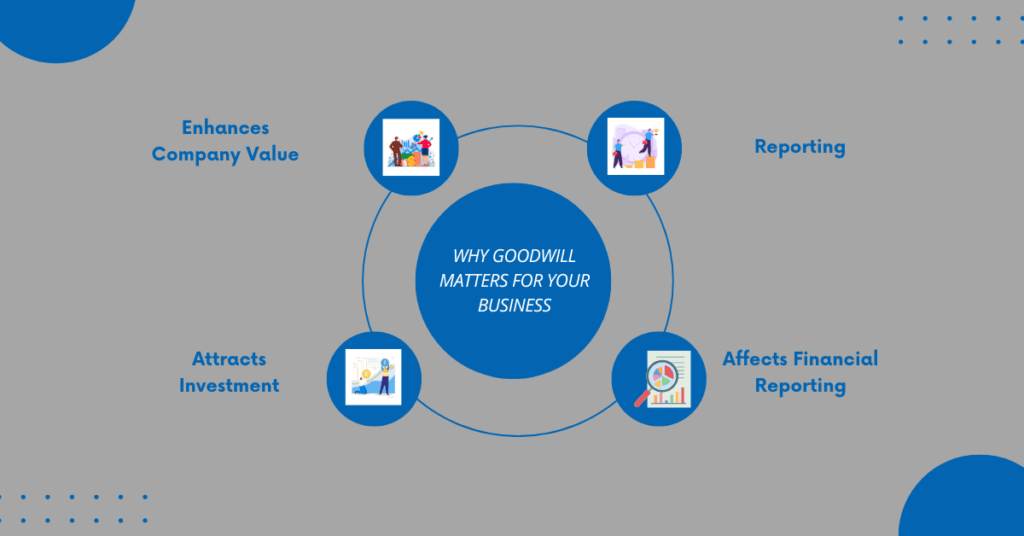When we speak of what is goodwill in accounting, we need to speak of an important aspect that companies have to be aware of especially when engaging in mergers or acquisition. Goodwill is simply defined as an aspect of the value of an organization that does have a physical existence. In simple terms, goodwill is the amount by which more than the acquirer business is purchased by another company than the fair value of the tangible and intangible assets. What is Goodwill in Accounting and Why It Matters for Your Business.
It’s important for business owners, financial manager and investors to know what is meant by goodwill in accounts. It helps in making informed decisions regarding the company’s financial health and future growth opportunities.
Definition of Goodwill: What It Really Is
Definition of Goodwill – Just to begin with, it is important to establish what exactly is meant by goodwill, irrespective of its type. Goodwill in accounting is the amount that is paid by one company to acquire another company and is more than the value of the purchasing company’s Net tangible assets, qualified by the ‘identifiable’ value of the acquired enterprise’s assets. These tangible may encompass land, buildings, plant and equipment, while Intangible assets include patents, trademarks, and intellectual property among others.
Now that we understand the role of intangible assets and their purpose let us look at What is Goodwill in Accounting. The case of buying or increasing value of goodwill comes when a company is always valued more than the individual value of its components. When computing goodwill in an acquisition, the value further extended to such intangible factors shows the amount of faith that the acquiring firm has in the target firm’s future earning capacity.
How to Define Goodwill in Accounting Terms

To Define Goodwill in Accounting terms, let’s consider an example: Suppose there was a business that buys a competitor for $2 million, while the competitor has total net assets, including equipment, stock, and cash, of only $1.5 million. The additional $ 500,000 is in the form of goodwill.
So, what is goodwill accounting? Thus, the definition of goodwill accounting is what we are going to talk about in this paper. This is commonly known as an accounting system of taking the difference between the acquisition cost of an enterprise and the net book value of its individually recognized assets.
Goodwill is in fact an ‘intangible asset’, involving the fact that goodwill belongs to the immaterial value since it can not be viewed and touched, but it does have a worth, as it generates future gross commercial returns. Some of the intangible elements that create goodwill include:
- Brand recognition
- Strong customer relationships
- High employee talent and organization system
- The competitive position and market competition strategies
Why Goodwill Matters for Your Business

With the meaning of goodwill in mind, why does it matter to your business? Experience in mergers and acquisitions shows that goodwill can be a valuable intangible asset for your firm if you are thinking of expansion through acquisitions. On the positive side, it touches your balance sheet, financial statements, and credit worthiness for financing directly.
Here’s why goodwill is important:
- Enhances Company Value: It is noted that relative to the existing stock of the business goodwill can dramatically enhance the sale value of the company. Holding has to do with a strong brand and a good reputation; these characteristics can push up the price.
- Improves Competitive Position: Enterprise with large amount of goodwill usually hold a dominant market share, strong customer base, and a popular brand image. These factors most often help to achieve competitiveness with regard to rivals.
- Attracts Investment: This is why investors are become hesitant to give their money to businesses that have a lot of goodwill since it give earnings into the future. If your company has high goodwill, it is an index of a strong and stable business organization.
- Affects Financial Reporting: What is goodwill in accounts? In accounting, goodwill comes into play when preparing the consolidated financial statements especially at period of merger and acquisitions. The value of goodwill is also brought to the balance sheet as an asset hence extending the long term effects on the financial stability of the business.
How is Goodwill Recorded in Accounting?
To have goodwill imputed to it, it has to become an acquiring company in a formal sense. In the process, accountants establish the value of the tangible and intangible asset of the acquiring company and the acquired one. Once again the total value is pulled out and the purchase price is then compared to this total value and any excess or reduction from this value is known as goodwill.
For example, in our earlier example where a business pays $ 2,000,000 for a company valued at $1,500,000 net assets the $ 500,000 in excess is recorded as goodwill on the acquiring company balance sheet.
In brief though, what is goodwill accounting? It is an exceptional aspect of acquisition that guarantees that all assets- tangible and intangible are recorded rightfully.
Also Read | conduct a competitive analysis to grow your business
Goodwill Impairment: Why It Matters
The subject of accounting and recording goodwill must also consider goodwill impairment. In fact, goodwill does not have the characteristic of a tangible asset that is usually subject to an allowance for depletion over time. But it must undergo the annual impairment test. Now and then, the value of the acquiring firm may decline or the acquired firm forecasted earning potential shrinks; this forces the goodwill to be decreased, a process referred to as impairment.
Knowledge of this idea is vital because impairment can have an impact on the financial statements of the firm. A goodwill impairment charge has the effect of lowering the business’ total profitability and therefore gives investors a wrong perception about it.
Goodwill vs. Other Intangible Assets
Goodwill has to be clearly distinguished from other latent assets, for example, patents, trademarks or other components of the company’s intellectual property. Like the two, goodwill is an indeterminable asset, which cannot be sold, or subdivided from the rest of the business. Other ASSETS, on the other hand, may be described and distinguished as follows; o Intangible assets can be individually valued and marketed.
So, What is Goodwill in Accounting ? It is a special category of the intangible asset – this one appears only if a company buys another one. On the other hand, there are other kinds of intangible assets that are developed and possessed by the company progressively regardless of acquisitions take place.
Conclusion: The Concept of Goodwill as it Relate to Your Business
In conclusion, therefore, what is accounting goodwill? The amount by which the worth of a company exceeds the fair market value of its total assets during an acquisition – it’s the name, reputation, the good will that the business establishment enjoys. Goodwill is very important for any business involved in an acquisition deal because it forms part of the balance sheet and the company’s reports after the merger as well as the future prospects of the company.
Realizing what is goodwill in accounts is crucial for business and investment evaluation and when considering acquisition opportunities. Understanding how to control and document goodwill and recognizing potential impairments helps your business maintain its overall sound financial health and possible impairment tests ensure transparency to shareholders.
Therefore the next time you are summing up the value of an organization, remember goodwill extends beyond face value. One of the essential aspects of accounting and something that has potential serious consequences for your business’s development.
Goodwill, as a matter of fact, is not only an evidence of past glories of a business unit but it has the potential of being a strong predictor of the future performance. In any case of buying another business, or even assessing their own company’s financial standing, knowing about goodwill and its role in the world of accountancy is going to stand anyone in good stead in the future. here are explain What is Goodwill in Accounting .







